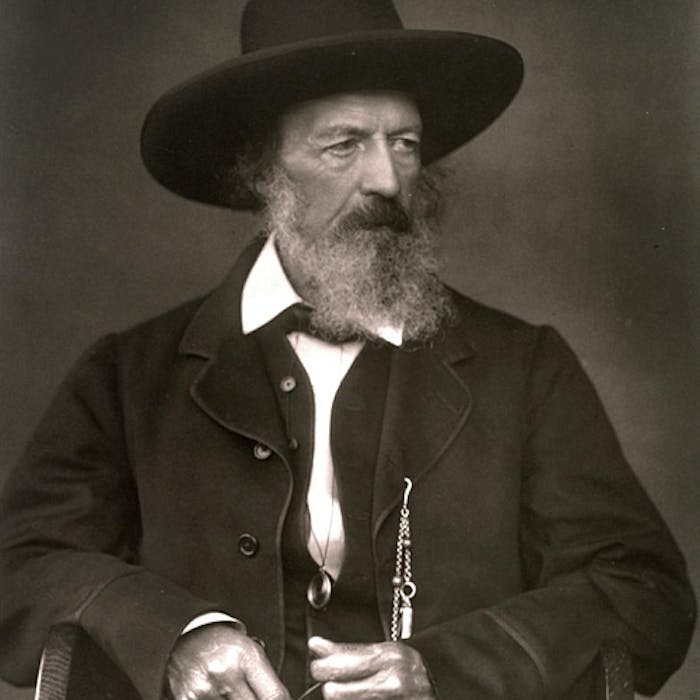
Alfred, Lord Tennyson - prolific poet of the Victorian Age
One of the most famous English poets, Lord Alfred Tennyson's career spanned 62 years in a life of 83. Tennyson succeeded William Wordsworth as Poet Laureate in 1850, and he was a source of consolation to Queen Victoria when Prince Albert died in 1861. Of his poem 'In Memoriam', she said 'Next to the Bible, "In Memoriam" is my comfort.'
Tennyson was born in 1809 in the village of Somersby in Lincolnshire. He was the third of eleven children. His father, a rector, was both a scholar and poet himself, and provided Alfred with a sound knowledge of Latin and Greek, which would inform his work.
After attending Louth Grammar School, in 1827, he entered Trinity College, Cambridge, and at only 17 years old, published his first volume of poetry in collaboration with his brother Charles, entitled Poems by Two Brothers. He left Cambridge in 1831 without a degree, following the death of his father and ensuing financial difficulties, but published another volume of his poems, including The Lotos-Eaters, The Palace of Art, and The Lady of Shalott.
At Cambridge Tennyson had befriended Arthur Henry Hallam, and their brief friendship was to become arguably the most important and intense relationship of Tennyson’s life. The 22 year-old Hallam died suddenly of a brain haemorrhage, and Tennyson was inspired to write In Memoriam in tribute. It was in this period that he also wrote some of his most characteristic work, including: The Two Voices (of which the original title, significantly, was “Thoughts of a Suicide”), Ulysses, St. Simeon Stylites, and, probably, the first draft of Morte d’Arthur.
In 1842 Tennyson published Poems, in two volumes, including Morte d’Arthur, The Two Voices, Locksley Hall, and The Vision of Sin. The new volume was not on the whole well-received. But a grant to him at this time, by the prime minister, Sir Robert Peel, of a pension of £200 helped to alleviate his financial worries. In 1847 he published his first long poem,The Princess, a singular anti-feminist fantasia.
In 1850 he resumed a relationship with Emily Sellwood, followed by marriage. His elegies on Hallam that Tennyson had been composing over the years then appeared, at first anonymously, as In Memoriam (1850), which had a great success with both reviewers and the public, won him the friendship of Queen Victoria, and helped bring about, in the same year, his appointment as poet laureate. In Memoriam, a vast poem of 131 sections, touches on many intellectual issues of the Victorian Age as the author searches for the meaning of life and death, and the struggle to reconcile traditional religious faith and belief in immortality with the emerging theories of evolution and modern geology.
After his marriage, the Tennysons took a house, Farringford, in the Isle of Wight, where he was to spend most of the rest of his life, and at Aldworth near Haslemere, Surrey. Tennyson’s position as the national poet was confirmed by his Ode on the Death of the Duke of Wellington (1852) — and the famous poem On the Charge of the Light Brigade at Balaklava, published in 1855. The poem Maud is regarded as a strange and turbulent “monodrama,” which provoked a storm of protest by those shocked by the morbidity, hysteria, and bellicosity of the hero.
A project that Tennyson had long considered at last issued in Idylls of the King (1859), a series of 12 connected poems broadly surveying the legend of King Arthur from his falling in love with Guinevere to the ultimate ruin of his kingdom at Camelot. The Enoch Arden-published volume of 1864 perhaps represents the peak of his popularity. New Arthurian Idylls were published in The Holy Grail, and Other Poems in 1869.
In his later years, Tennyson tried his hand at poetic drama, but his theatrical productions had only limited success. The Promise of May — his only prose work — shows Tennyson’s growing despondency and resentment at the religious, moral, and political tendencies of the age.
Tennyson accepted a peerage (after some hesitation) in 1884. In 1886 he published a new volume containing Locksley Hall Sixty Years After, consisting mainly of imprecations against modern decadence and liberalism and a retraction of the earlier poem’s belief in inevitable human progress. Despite ill health, he was able to correct the proofs of his last volume before he died, The Death of Oenone, Akbar’s Dream, and Other Poems (1892).
Further reading
Links to external websites are not maintained by Bite Sized Britain. They are provided to give users access to additional information. Bite Sized Britain is not responsible for the content of these external websites.
